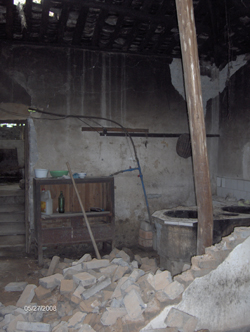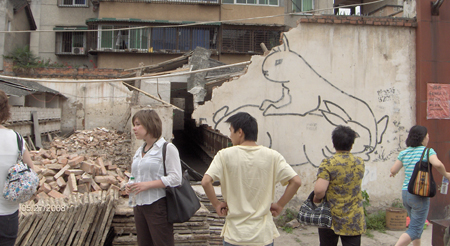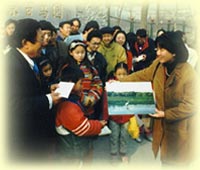Earthquake Aftermath: Rebuilding and Sustainability
Reports from Sichuan Province
May 29, 2008:
Dear Friends:
To paraphrase Charles Dickens' Tale of Two Cities, it is the worst of times, and the best of times for China. The full dimension of the earthquake's impact is still unfolding. Aftershocks are destroying damaged buildings. The economic dislocation on people like the Xupings [Ren and Zhang Xuping, the founders/owners of the Sichuan Xuping Rabbit Raising Company and the Rabbit King Poverty Alleviation Research Center] is just settling in and is quite threatening. "Earthquake dams" pose new threats.
The good news is that China's people, from super wealthy entrepreneurs to ordinary citizens are pitching in and lending helping hands spontaneously and with the kind of organic coordination that one sees as bicycles and cars dance through China's streets miraculously without colliding. Real, genuine, and healthy national pride is appearing. Citizens are feeling and acting on a sense of empowerment that is being given wide berth by the government, which now finds itself more open to and subject to political and moral accountability. It is a situation where active and informed citizenry is a national asset, and not a threat.
As we left Chengdu for Dayi yesterday, an endless caravan of ambulances and EMT vehicles with silent flashing lights, from all over the country, streamed into Chengdu with its daily delivery of injured from the earthquake zone. All of China's major cities are represented in the caravan. Du Heng, our Chinese colleague, looked with sadness and joy at the helping hands.
An hour and a half later we arrived at Qili village, in the mountains near Dayi. The Xupings escorted us there and we were met by the village members who stood by a red banner announcing that today the second day of gifting micro-loans was just about to happen. As we entered the gate to a central compound where we had distributed the first round of loans just five weeks earlier, we found hundreds of newly constructed brick rabbit hutches made by Wang Yu, the 18 year old male star of our Qili program. The hutches were undamaged by the quake. Next to the hutches villagers had erected a makeshift stage with more red banners, speakers, and music. "Distant foreigners" were greeted with special warmth, even for China. We were a sign of hope and affirmation, for all was not well in Qili. Many of its humble homes are damaged, and much of the population was sleeping in tents for fear that buildings would fall in the after shocks. I met a five year old who had run from his kindergarden as the building collapsed.
The mood was hopeful, and, despite the injury to the village, there was joy in the air as we had helped to cultivate a sense of "we can help ourselves" that had been present in Qili before we arrived, but now "with a little help from our friends" Qili hopes to transcend the new challenge.
Soon after gathering we made four circles, and like dragons chasing our tails we danced and held each others shoulders, providing comfort.
Wang Yu showed us the rabbits he was breeding; their offspring will soon occupy the new hutches. Those who had received micro-loans in April gave us reports. This was followed by a cultural program of singing, dancing and a magic show. All affirming and defiant in the midst of daily uncertainty about aftershocks. Officials from the Sichuan Poverty Alleviation Center, and village and town officials are present and involved actively with the Xupings, whom they know and respect. They are also curious to see how we are managing the earthquake aid.
After entertainment, new loan recipients signed forms and received cash, a booklet made by ECOLOGIA and Xuping poverty alleviation center staff outlining the principles and spirit of the project, and a plaque designating the household as a participant in the micro-loan program. (The plaque is displayed proudly at the entrances to households participating in our loan program.) Income from rabbit breeding will very significantly impact household incomes. But the earthquake has complicated the situation. Some households had the section that they were going to use for rabbit breeding damaged or destroyed. Other houses are so severely damaged that they are temporarily uninhabitable, and may become permanently so. So much depends on aftershocks.

So, the upbeat part of our Qili visit ended and we began to tour damaged homes. Many of the older poorer homes had moderate damage - a collapsed wall, caved-in section of roof, roof tiles shaken off and smashed. Large poles were shoved up against bulging walls, preventing collapse. Repairs had begun. A few older homes and one new home were very badly shaken and appeared to be beyond repair.
Of the two hundred households in Qili village, we estimate that half will need repair, and several will need to be completely rebuilt. This is where we saw our opportunity, a challenge that ECOLOGIA, the Xupings, and the Xuping Poverty Alleviation Center staff spent the afternoon discussing.
Here is what we concluded:
-
It is a fortunate accident that we had spent the last six months deeply rooting ourselves in Qili village and not one of the more devastated villages nearby. ECOLOGIA has adequate resources to address the needs of Qili. Devastated villages will require a totally different order of magnitude of financial and social input.
- We can act quickly, literally in the coming days and weeks, by providing loans and technical support for home repairs and rebuilding. In so doing we can create a realistic model that can show others in the region what can be done. By making reconstruction a village activity, we can create capacity, including business capacity, that could allow under-employed villagers to assist others in earthquake recovery and building. Our goal is to create practical "how-to" fact sheets showing those in damaged homes how to do such things as:
-
How to reinforce roof rafters and make them more earthquake resistant using locally available materials such a bamboo;
- How to re-use and recycle rubble and make reinforced stronger walls;
- How to incorporate healthier technologies where old fixtures are shattered, for example unvented indoor cooking ovens using brown coal can be replaced with biogas stoves thereby reducing significant indoor air pollution.
- We will provide a loan and partial grant to quickly rebuild one destroyed house and use it as a realistic "state of the art" model for what an environmentally friendly and earthquake resistant home can be. ECOLOGIA and the Xupings do not have expertise in this field, but we have a number of local expert partners and student volunteers who can pull this information together in the coming days and weeks.
- We will begin this work in Qili village, and to the degree that additional contributions to our Earth Quake relief fund allow, we will replicate this in other villages. The cost per village will be about 15-20,000 USD.
- Finally, and very important, we will continue and expand our previous sustainable development micro-lending project with the Xupings' Poverty Alleviation Center; the regional economy is devastated and income generating activities suitable to providing services to the local economy are desperately needed.
In sum, we have already put in place part of the solution that Sichuan's villages need, and the new pieces that are needed fit nicely into what we are able to do.

The dilemma facing the Xupings personally is a problem that is described above in microcosm. Their "factory" (rabbit breeding facility, fur manufacturing, training center, and personal/staff residences - see photo above) is severely damaged and may tumble if big aftershocks hit before repairs are made. The supply chain upon which their village entrepreneurs depend is shaken. The Xupings have a reasonable expectation that they will receive government aid. They are ever more determined to get to Vermont, with a Sichuanese delegation, and see a world class LEED manufacturing building, as they hope that they can build such a facility in the center of Dayi as an inspiration and challenge for others to rebuild in a way that is physically safe, ecologically sustainable, energy-saving and economically sound.
9:45 pm Chengdu May 28, 2008
Dear Friends:
We (ECOLOGIA staff) just spent the day with the Xupings and residents of Qili Village where we began our micro-loan project. This village is moderately impacted by the earthquake.
ECOLOGIA and the Xupings will be launching a supplementary micro-loan program in Qili in the coming days. The goal of our additional micro-loan program will be to help repair many damaged and unstable homes, and to quickly rebuild one destroyed home modeling more earthquake proof and environmentally friendly technology. If we do this very quickly and well (we have a team of four working on earthquake rebuilding techniques, including some real local experts), Qili Village can be a model for the massive re-construction that is scheduled to begin in three months and continue for three years. The Xupings' six story "factory" (rabbit breeding farm, fur manufacturing center, training center and residence combined) was very severely damaged and if aftershocks continue, will be irreparable. I am determined to get them and a Sichuan delegation to Vermont to see NRG Systems' ecologically sound LEED-certified factory, and bring back an aspirational model of green building which is probably beyond feasible replication for the 60% of damaged buildings in Dayi, but which can nevertheless serve as a visible beacon of hope and what one must strive toward.
The Xupings are more extraordinary than ever. The China Daily feature reporter who spent the day with us just finished and submitted her story which should be in Thursday's paper, the major English language paper in China... When I send you a more lengthy report and photos after a few hours of sleep and emotional recharge, you will understand the reporter's feelings. I think that you will be able to access the story at www.chinadaily.com.cn.
Randy Kritkausky
|


